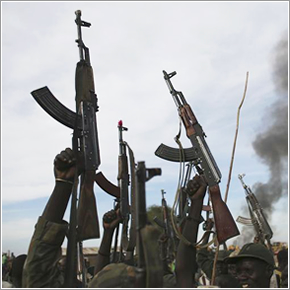The African Union (AU) Peace and Security Council (PSC) should immediately consider, publish and disseminate the final report of the Commission of Inquiry into human rights violations and abuses committed in South Sudan said 76 organizations in an open letter to the 15 PSC member states.
In January 2015, AUPSC members decided to defer consideration or publication of the African Union Commission of Inquiry on South Sudan (AUCISS) report because they thought it would obstruct the achievement of a peace agreement. But as a 5 March deadline for reaching a final agreement has now passed, the organizations renewed calls for the report to be published.
“A culture of impunity has fuelled South Sudan’s conflict and emboldened combatants to target civilians, commit sexual violence, destroy and loot civilian property without fear of legal consequences,” said Arnold Tsunga, Africa Director of the International Commission of Jurists. “The release of the report could help deter further atrocities, by bringing to light what has taken place and making more real the prospect of accountability,”
For over a year, parties to the conflict have demonstrated disregard for international human rights and humanitarian law. UNICEF recently reported the forced recruitment of what it believes may be hundreds of children in Upper Nile state to serve in a government-allied militia group.
The AUCISS had the mandate to investigate human right abuses and violations in South Sudan and make recommendations on the best ways to ensure accountability, reconciliation and healing.
“The Government and the Sudan Peoples’ Liberation Movement-In Opposition (SPLM-IO) have already agreed that a comprehensive system of transitional justice—including truth and reconciliation, criminal prosecution, reparations and institutional reforms—is necessary for achieving sustainable peace,” said David Deng, research director with South Sudan Law Society. “The AUCISS recommendations could make an important contribution to the design of such processes.”
In their letter to AUPSC members, the organisations urged the immediate publication of the report in order to honour the expectations of victims and witnesses of atrocities who recounted painful experiences in order to contribute to a more complete record of the conflict.
“Hundreds of people took time to speak with members of the AUCISS because they thought the report could make a positive contribution to the future of South Sudan. Shelving the report demonstrates a complete disregard for the individuals whose testimonies, ideas, and opinions were used to compile the report,” said Frans Viljoen, Director of the Centre for Human Rights at the University of Pretoria.
The seventy-six organizations reminded the PSC of its obligations under the PSC Protocol to promote “good governance and the rule of law, protect human rights and fundamental freedoms, respect for the sanctity of human life and international humanitarian law, as part of its efforts for preventing conflicts.”
“We urge you to prove wrong those who doubt the commitment of the AU to justice and accountability by receiving, considering, and immediately publishing the AUCISS report,” the letter concludes.
Background
The PSC is the AU’s standing decision-making organ for the prevention, management and resolution of conflicts. Its current members are Algeria, Burundi, Chad, Equatorial Guinea, Ethiopia, Gambia, Guinea, Mozambique, Namibia, Niger, Nigeria, Libya, South Africa, Tanzania, and Uganda.
Only two weeks after the outbreak of violence in Juba in December 2013, the PSC called on the African Union Commission to establish a commission of inquiry. In March 2014, Chairperson of the AU Commission, Dr. Nkosazana Dlamini-Zumapresided over the swearing in of the six members of the AUCISS: former president of Nigeria, Olusegun Obasanjo (the chairperson), Sophia A. B. Akuffo, Mahmood Mamdani, Bineta Diop,and Pacifique Manirakiza.
In June the Commission submitted an interim report to the PSC and was granted a three month extension of its mandate to complete work. In its June interim report, the AUCISS promised that the recommendations to be included in its final report would contribute to finding lasting solutions to the crisis in South Sudan.
The PSC heads of state were scheduled to consider the AUCISS report on 29 January 2015, but instead decided to “defer consideration [of the report] to a later date.” The chairperson, Olusegun Obasanjo was not given an opportunity to present the report’s content and the report was not distributed to the PSC members.
Meanwhile, the Government of South Sudan has made no credible efforts to hold accountable individuals responsible for crimes under international law and other serious violations and abuses of international human rights law.
Negotiations between the Government of South Sudan and the SPLM-IO are being brokered by the Intergovernmental Authority on Development (IGAD), an eight-member regional body. Despite multiple commitments to cease hostilities, the conflict has continued. On 1 February President Salva Kiir and opposition leader Riek Machar signed an agreement committing to conclude a final peace agreement by 5 March. Despite this, negotiations have failed to result in a final agreement.
For more information or to arrange an interview contact:
- For the Association of Women for the Development and Culture of Peace in Chad: Céline Narmadji, (+235) 66 29 40 85 / 99 12 13 59, narmadjicel.64@gmail.com
- For Amnesty International: Mildred Ngesa, mildred.ngesa@amnesty.org, +254 732 495 215
- For International Commission of Jurists: Arnold Tsunga, +27 (71) 6405926, arnold.tsunga@icj.org
- For the Centre for Human Rights at the University of Pretoria: Frans Viljoen, +27 012 4203228, frans.viljoen@up.ac.za
- For the Institute for Justice and Reconciliation: Friederike Bubenzer, friederikebubenzer@gmail.com
- For the South Sudan Law Society (SSLS): David Deng, +254 703754068 ddeng@sslawsociety.org
- For Assistance Missions for Africa: James Ninrew Dong, +211 955224368, jninrew@yahoo.com
- For the Institute on Human Rights and Development in Africa: Djeugoue Brice Martial, +2207751208, bmdjeugoue@ihrda.org,


